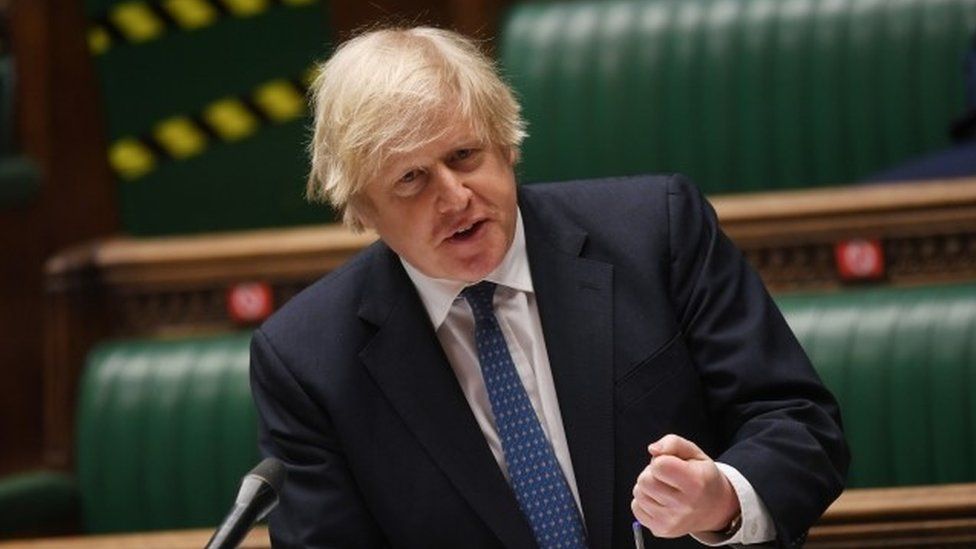Boris Johnson accused of lying to MPs over Labour's NHS pay stance
- Published

Labour has accused Boris Johnson of lying to MPs after he wrongly claimed Sir Keir Starmer had voted against a pay rise for NHS workers in England.
The party is calling on the PM to "correct the record" after he said Labour had voted against a 2.1% rise.
The 2.1% proposal - which has since been scrapped in favour of 1% - was approved without a vote in 2020.
Downing Street said the mistake had been clarified and there was no need for the PM to apologise.
During exchanges at Prime Minister's Questions, Sir Keir said: "Two years ago he made a promise to the NHS - here in black and white, his document - it commits to a minimum pay rise of 2.1%. It's being budgeted for and now it's being taken away.
"He shakes his head - his MPs voted for it. So why, after everything the NHS has done for us, is he now breaking promise after promise?"
Mr Johnson replied: "He voted against the document in question to crown the absurdity of his point."
'Clarification'
Labour's shadow health secretary Jonathan Ashworth called on Commons Speaker Sir Lindsay Hoyle to "get the prime minister to return to the House and correct the record".
Mr Ashworth said: "The prime minister has twice, from that dispatch box, said that the Labour opposition voted against the NHS Funding Bill and the 2.1% increase for NHS staff. This is not the case."
Sir Lindsay said Mr Ashworth's intervention was not something he would rule on but added "it is certainly a point of clarification - that part has been achieved".
Writing on Twitter later, Mr Ashworth said that Mr Johnson had "lied at PMQs" and repeated Labour's demand for a vote in Parliament on the 1% offer.
Sir Keir Starmer asks whether nursing staff deserve a bigger rise than the PM's former adviser Dominic Cummings.
He has written to the PM to ask him to "correct the record", telling him: "At all times in the debate, Labour attempted to secure a greater financial settlement for the NHS in order to improve patient care."
Labour says the proposed 1% rise amounts to a pay cut, when inflation has been taken into account.
Mr Johnson says it is all the country can afford at the present time, and NHS workers are set for a rise amid a public sector pay freeze, to reflect the "massive debt" owed to them by the nation.
The PM says he will make a final decision on pay when an independent review reports back in May.
Did Keir Starmer vote against NHS plan?
Boris Johnson told MPs Sir Keir Starmer voted against the 2019 long-term plan for the NHS, after the Labour leader referred to it.
That is not correct - there were no votes on the NHS Funding Bill 2019-20 during its main stages through parliament.
Sir Keir had referred to the plan, saying that it committed the government to a 2.1% pay rise for the NHS.
The government has now recommended that NHS staff in England should receive a 1% pay increase this year.
On Tuesday, the head of NHS England, Sir Simon Stevens told a committee of MPs that the plan had indeed assumed a 2.1% rise.
But he also said "things have changed" since then and that it should now be up to the pay-review body.
The prime minister's press secretary Allegra Stratton was asked more than 20 questions about the row at briefing for Westminster journalists.
She indicated that he would neither apologise nor correct the record.
"The key thing is that this was dealt with swiftly and the Speaker - who has enormous respect and authority in Parliament - regards it as a point of clarification and it has now been dealt with," she told reporters.
Asked if Mr Johnson had a problem with facts, Ms Stratton said: "No, he doesn't. The Speaker addressed this as a point of clarification and it has been dealt with today."
The ministerial code states that it is of "paramount importance that Ministers give accurate and truthful information to Parliament, correcting any inadvertent error at the earliest opportunity".
Ms Stratton said Mr Johnson "absolutely agrees" with the ministerial code and "in this instance the system worked" because the Speaker had responded to Mr Ashworth.
- Published10 March 2021
- Published22 July 2021
- Published9 March 2021